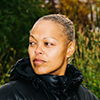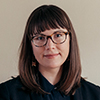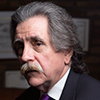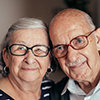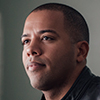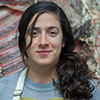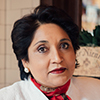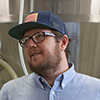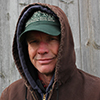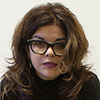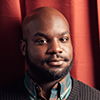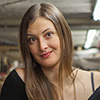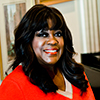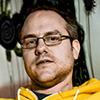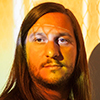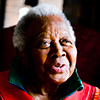



Stanley and Josephine Lyskanowski, 89 and 80 respectively, are Polish-born Catholics forced into exile by World War II. They both arrived in the U.S. in 1952, married in 1961, and a few years afterward moved into their house in Norwood Park, where they have remained ever since. Part 1 of 2.
Interview by Aimee Levitt
Photos by Jeffrey Marini

Stanley: I was born near Warsaw, Poland. The war started in ’39 between Germany and Poland. A year later, my sister and my brother were taken as slaves to Germany. I was lucky because I was 14, and they were taking above 16. But then the following year, I thought, well, they might take me next year. And I joined the underground. It was with the church, distributing pamphlets against the atrocities with the Germans that fought in Warsaw. If there was any disagreement whatsoever, they would just shoot you. It was very severe, the way the Germans conducted themselves. They raided. They came at night to my house and caught me. So that was more or less the end of my freedom.
The prison was Pawiak. The interrogation lasted almost a year. They tried to get all the information out of me to get the others’ names. I never revealed them. They not only questioned, but they tortured us quite a bit. I lost a couple teeth.
One Sunday morning, planes came over Warsaw. They took us out and were ready to fire at us. But because of the raid, for some strange reason, they put us back in our cells. We waited a few more weeks. One evening, they took us out again, tied together, hands and legs, and put us in cattle cars. Doors closed, no windows, sealed, completely sealed. And they packed us, 1,500 of us. There was almost a thousand of us and about 600 Jews. We thought we were going for execution.

Because of the Russians invading Poland and fighting and advancing really fast, a year or so later the cattle cars took us to Austria. Mauthausen-Gusen. Because of Russia’s advance into Poland, they were evacuating all the Jewish ghettos. There were mainly Jews with us. As soon as we [arrived], they separated [us]. And Jews went to the washrooms first and undressed. They pulled us out, waited. We were confused. We looked down there. We waited and we waited, and they never came out. We wondered, and we questioned the corporal what happened. Finally the gates open up, and they start bringing so-called lorries, huge cars. We wondered, what’s going on? They opened it. They never came out. They gassed them.
After that, I was told “Transport’s coming.” So we had to take them out and bring them to the crematorium. At first I was sick. I couldn’t take it. I fell down a couple times and was throwing up. But I felt they would shoot me, so I had to do it for several weeks until they let me go.
You know, in life, miracles happen. And one very high officer in the German army, he looked at me and said, “Was machst du hier?” He asked me what I’m doing here! I looked at him straight in the face and, you know, something is happening when you look at them straight in the face. After a few seconds or a minute, they look like humans, not anymore like a vicious thing that will hit you right there or kill you right there. He put me on the side. And that’s my first saving day.

Josephine: You were in the gas chambers three times and every time you were supposed to go into the gas chamber, somebody came in and said, “Stop! Something is happening!” You know, there was bombing going on or something.
Stanley: You could hear the planes coming up, and they always come low, and we could see the pilots. They were waving to us, telling us, “We will come and liberate you.”
At times I felt like, God, if you’re going to take me now, take me now. Somehow or another, I could practically hear, “Don’t you dare have such thoughts!” I could hear it. “Don’t worry. Just take it as it comes.” I said, “OK, God, that’s what you said, that’s what I’m going to do.” That’s why God had mercy on me, because every morning I got up just like I learned at home, and prayed.
First thing in the morning, whatever it was, 40 below, we had to—naked—run to the washroom, half a mile, take a cold shower, come back, get dressed, and go to work. And naturally I caught pneumonia. And the proclamation is, if you have a fever, 101, they take you straight to the crematorium. The so-called capos, the leaders, they had a group of 40 or 50 guys. He looked at me, again the same as the other one was. “How old are you?” I thought, uh-oh, I’m going to be shot. But no. He took me back to where we used to sleep. Barracks.

We had hundreds in one room. You have to imagine, there were a hundred beds, three high. And he says, “Go on the top, last one.” And he took pillows, a couple blankets. He gave me aspirin, a glass of water, drink. He says, “Later, when you hear steps, do everything in your power—don’t cough.” It’s hard. I’m choking. But when I heard this, God was with me, I didn’t have to really force myself because I stopped coughing. I closed my eyes. I had three pillows over my face. So that helped. And a few seconds, I could hear the steps, slow. Then he came, knocked three times. “You’ll be OK. Now you can breathe.” Three days later, my fever went away. He would give me aspirin in the morning and in the evening. Three days later, he says, “Sorry, you have to go to work.”
Josephine: Now, this is a German. So there were people that did good things to people. They were still humans. There were not too many of them. There were a few.
Stanley: I came out to work. We used to go work in a quarry. We had to build steps, a hundred steps. And then run, run to the top, take a piece of mountain, and then take pieces up and down, up and down, a hundred steps. Some were pretty good size, 20 pounds, 50 pounds. And naturally, you slip, what happens? Broken leg, broken hands, or head, or whatever. And then at the end of the day, we had to pick them up and take them direct to the crematorium. Some were still alive, unfortunately.

At the beginning of ’45—I will never forget that, three days in May, warm and nice—we could hear the advance. And all of a sudden, one day, they opened the gates. There came an order: “Stay in your room, you don’t go to work anymore.” So we stayed in one day, next day. Quiet. What’s going on? Third day, we could hear some noise. And all of a sudden, we could hear the shots, like guns. Oh, God, something’s happening. It was the eighth of May. I’ll never forget in my life, the eighth of May, my name day, Stanley. Eight o’clock in the morning, Sunday, there was suddenly a huge noise. Bang! So we looked over the window, and we see the gates crushed! And there was an American tank with two guys sitting in the front.
So of course we run out, greeting them, and a few guys right in front of them was the officer. Polish! One of them’s Polish! Because I couldn’t talk German except for a little bit, but we could talk Polish, and oh, my God! It was such a shock.
The next group of liberators were bringing food. And some got their food and they just eat and eat and eat—and die right there.
After four or five weeks, I start gaining [weight]. And [the doctor] says, “Well, what are you going to do?” I can’t work. I was too weak. And where could I go? We were trapped. No trains going, nothing. And then on tenth of October that year, all of a sudden, a Polish officer showed up. And they were looking for those who were liberated and feel good, [to see] if they want to join the Polish army. Hooray!

We were in Italy, waiting, hoping we were coming back to liberate Poland, naturally. About two years later, we have the tragic news: Russia is still in Poland and the Church of England, frankly to say, sold us out, said, “Do whatever you want with Poland.” So the Russians stayed in Poland. Some who missed family or wives or fiancees went back. But they never reached Poland. And I waited. I said, “You go, guys, first.” I had a friend, I said, “You write to me,” and he never wrote to me back, and I knew something had happened. So I said, “Uh-oh, I’m not going.” Sure enough, they landed in Siberia. And that was the end.
I stayed in England. But then came proclamation. President Truman at that time [said] 20,000 men between 20 and 30 in the Polish army would get a free visa to come to the United States. America, I have always loved. I remember from school, I used to read about America a lot and said, “One day I hope I will end up in there.” My prayers were answered. Two weeks later, I was on the Queen Mary, the biggest ship in England. It was beautiful. Five days later, I see the Statue of Liberty. Thank God! I land in New York. But guess what? I looked around for a few hours, and I didn’t like it! I just didn’t like the skyscrapers. They sort of scared me a little bit. But I hear there is a really, really good headquarters of Polish set in Chicago. This is it! So I jump in a train. We traveled all night from New York, and in the morning, we came into Chicago.

I stayed on the south side. I met a lot of Polish people, and I was surprised, because I asked in Polish, “How long have you been here?,” and it was 50 years. And they didn’t speak English. And I said, “Why didn’t you?” “For what?” he says. And that struck me. That was the greatest mistake they made. And I said, “I’m not going to make that mistake.” I went to school, learned my profession, graduated in electronics, got my degree. And the rest is right here.
Josephine: And you bugged me, and we decided to get married.
I was born in Poland, but I was born behind the iron curtain, on the border of Russia, which is Belarus now. When the war started, [the Russians] came in one day, early in the morning with the gun, woke my mother. And, of course, my brother and I. My brother was three and I was five. They told my mother to pack, that she had two hours to pack the two of us and herself. They didn’t say where we were going or what was going to happen. My father rushed home [from work] and was able to be taken with us. So the whole family was loaded into the cattle cars and just kept on going. We were just going, going, going until we ended up in Siberia.



